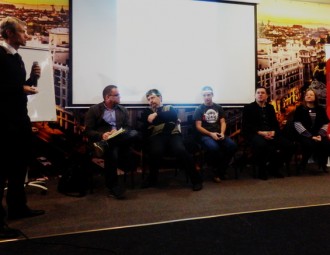Experts: The dominance of Russian language in Belarus is dangerous
02.10.2016 | Society
 photo by "EuroBelarus" Information Service
photo by "EuroBelarus" Information Service
How can one save and protect the independence of the country where national identity is immature?
The Week of Belarusian Thinking is over; but many noteworthy topics that were discussed during it have escaped the focus of attention. "EuroBelarus" Information Service continues to discuss things that are at the center of attention of Belarusian intellectuals.
Experts spoke about the independence and national identity of Belarusians.
Publisher Valery Bulhakau noted that Belarus’ borders were set in the second half of the 19th century by Russian imperial ethnographers primarily on the basis of linguistic reasons.
"In my area, those who are now over 45, still speak Belarusian, while those who are 15-25 – are already using almost literary Russian language. In my opinion, this is risky,"- the publisher says.
According to him, Belarusian community in our country today is a subculture.
"Such things as national independence are decided not by the authorities, not by political administration, but by ordinary citizens. Belarus’ public space is divided into many sub-cultures, including Belarusian-speaking minority, Russian speakers, and the older generation, who doesn’t know any other language than Russian,” Valery Bulhakau added.
However, linguistic orientation does not fully define national identity.
"For me, the most important thing is to preserve the national identity of a high literary tradition, - shared researcher of Belarusian cuisine Ales Bely. – It’s impossible to imagine France without its symbolic field that Moliere, Balzac, and Dumas created. We don’t have institutions that would rebroadcast this symbolic field."
According to the representative of simbal.by store Mikita Brouka, it’s impossible to preserve the independence of the country without national identity. But whether Belarusians have it is a hard question.
Doctor of Philosophy, Doctor of Sacred Theology, Academic Director of the Belarusian Collegium Iryna Dubianetskaja suggested Belarusians to put themselves in their own context and see what happened to us.
"The current identity is built with the knowledge of cultural treasures, history, and tradition. The Grand Duchy of Lithuania had a peculiarity that distinguished it from other countries – multi-religiousness. It was destroyed during the country's total Russification", - she noted.
According to Iryna Dubianetskaja, today we are forced into the official bilingualism, which compared to the previous multilingualism is a radically different, opposite thing.
"Bilinguals are Belarusian-speaking people in Belarus. Russian speakers don’t have such linguistic traditions. Giving any official status to the Russian language in Belarus is very dangerous, because two and a half centuries of total Russification have simply pushed the Belarusian language out."
"Let me note how the Belarusian ethnic map started losing Poles and Russian according to census. Their number is decreasing dramatically – by 25% over the past 10 years. Gradually all of them transform into Belarusians. After all, it’s very easy to be a Belarusian: you don’t need to know the Belarusian language and history apart from our victory in the Great Patriotic War," - ironically pointed out sociologist Aliaksei Lastouski.
Thus, the national identity of Belarusians is still developing, but we should strengthen it without forgetting about the danger that comes from our eastern neighbor.
-
03.01
-
07.10
-
22.09
-
17.08
-
12.08
-
30.09



























